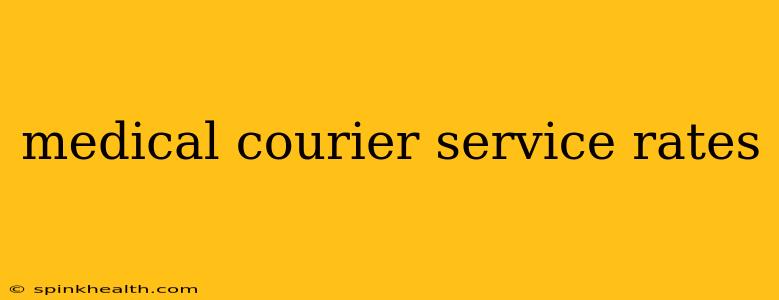The frantic beep of a heart monitor, the hushed urgency in a hospital hallway – these are the scenes where medical courier services become lifelines. But navigating the pricing landscape of these crucial services can feel like navigating a maze. This isn't just about transporting packages; it's about the timely delivery of potentially life-saving materials. Let's unravel the complexities and shed light on the factors that determine medical courier service rates.
My name is Alex, and I've spent over a decade in the healthcare logistics industry. I've witnessed firsthand the vital role these services play, and I'm here to break down the pricing structures in a way that's both informative and easy to understand.
What Factors Influence Medical Courier Service Rates?
Several key factors intertwine to determine the final cost of a medical courier service. It's not simply a matter of weight and distance; the urgency and sensitivity of the shipment significantly impact the price.
1. Distance and Location: The Geographic Puzzle
The distance between the pickup and delivery points is a fundamental factor. Longer distances naturally translate to higher fuel costs and increased driver time, directly affecting the final rate. Urban areas, with their traffic congestion, often command higher rates than rural routes. The specific location, including accessibility and security considerations, also plays a role.
2. Speed and Urgency: Time is of the Essence
Medical couriers often operate under strict time constraints. "Stat" deliveries, demanding immediate transport, are priced considerably higher than routine deliveries. The urgency level directly correlates to the expedited service required, potentially involving specialized vehicles or flight options.
3. Type of Shipment: Beyond Just Packages
The nature of the shipment itself is crucial. Transporting temperature-sensitive specimens (blood samples, organs) requires specialized vehicles equipped with temperature control systems, adding to the overall cost. Hazardous materials require additional safety measures and licensing, further influencing the price. The size and weight of the shipment are also factored into the calculation.
4. Insurance and Liability: Protecting the Precious Cargo
Medical couriers carry significant liability. The value of the shipment, the risk of loss or damage, and the level of insurance required all impact the pricing. Higher-value shipments necessitate more comprehensive insurance coverage, which is reflected in the final cost.
5. Vehicle Type and Resources: Specialized Needs
Some deliveries require specialized vehicles, such as refrigerated trucks or motorcycles for navigating dense urban areas. The use of such specialized vehicles increases the service cost. The need for additional resources like GPS tracking, real-time monitoring, or dedicated personnel further impacts the price.
Frequently Asked Questions (FAQs)
Here are some common questions I frequently get asked regarding medical courier service rates:
How much does a medical courier cost?
There's no single answer to this question. The cost varies widely depending on the factors outlined above. A short, local delivery of non-temperature-sensitive materials will cost significantly less than a long-distance, time-sensitive transport of organs requiring specialized refrigeration. Getting multiple quotes from different providers is essential for comparison.
Are medical courier services more expensive than regular couriers?
Yes, generally speaking, medical courier services are more expensive than standard courier services. This is due to the stringent requirements for handling sensitive materials, specialized equipment, and the often urgent nature of the deliveries. The need for skilled drivers trained in handling medical materials, strict regulatory compliance, and insurance also contribute to higher costs.
What types of medical supplies do medical couriers transport?
Medical couriers transport a wide range of medical supplies and materials. This includes but is not limited to blood samples, organs for transplantation, pharmaceuticals, tissue samples, medical equipment, and diagnostic specimens. The specific items transported will depend on the courier's capabilities and licensing.
Do medical courier services offer real-time tracking?
Many reputable medical courier services offer real-time tracking capabilities. This allows clients to monitor the location and status of their shipment throughout its journey. This technology is particularly useful for time-sensitive deliveries, ensuring that recipients are informed of any potential delays.
How can I find a reputable medical courier service?
Researching potential providers is key. Look for companies with established experience, proper licensing, and a strong track record. Check online reviews and testimonials to gauge their reliability and customer service. Ask about their insurance coverage, security measures, and temperature control capabilities, ensuring they meet your specific needs.
In conclusion, understanding the nuances of medical courier service rates requires considering various interlinked factors. By understanding these elements, you can make informed decisions when selecting a provider and ensure the safe and timely delivery of your critical medical shipments. Remember, it's always best to obtain quotes from multiple providers to compare pricing and services before making a final choice.

